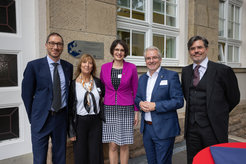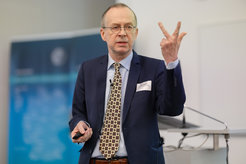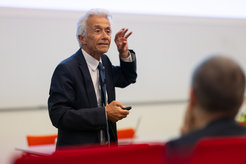Europe's chemists celebrate two
pioneers of polymer research
Max Planck Institut für Kohlenforschung receives the “Historical Landmark Award” of the European Chemical Society
The Max Planck Institut für Kohlenforschung was honored with the “Historical Landmark Award” of the European Chemical Society at a ceremony. Numerous guests attended the event.

Scientific milestones are rarely the work of individuals. Many different researchers are usually involved before a new discovery can reach its full potential. How enormously important Karl Ziegler's work was for the further development of the Mülheim campus, is probably known to most people at the MPI für Kohlenforschung; the same applies to the work of Giulio Natta, who was awarded the Nobel Prize for Chemistry together with Karl Ziegler in 1963.
Now the achievements of these two exceptional scientists have been officially recognized at a ceremony at European level. Together with the Politecnico in Milan, where Giulio Natta worked, the MPI has received the “Historical Landmark Award” of the European Chemical Society. To mark the occasion, a delegation from Italy and representatives of EuChemS visited our campus to celebrate together with the Mülheim scientists.
Highlights of the festive event were two scientific lectures: While Gaetano Guerra from University of Salerno dealt with the legacy of Ziegler and Natta in polymerization catalysis, Alois Fürstner, Director at the MPI für Kohlenforschung, explored the question of why Ziegler could not help but discover the polymerization of olefins.

The extent of Ziegler's influence on the development of the MPI became clear in the welcoming address by Frank Neese, Managing Director of the institute and host of the event. “While Ziegler's predecessor Franz Fischer was primarily concerned with coal, Ziegler insisted on absolute scientific freedom,” said Neese.
“For us, the Historical Landmark Award is an important instrument for highlighting the importance of chemical research and work throughout Europe,” explained Angela Agostiano, President of EuChemS, in her welcoming address. EuChemS sees itself as the joint voice of all chemists throughout Europe and represents the interests of both research and the chemical industry.
Gianluca Farinola, President of the Italian Chemical Society, the Società Chimica Italiana, emphasized that the award makes it clear that scientific progress is not only a cooperative endeavor, but also a multi-location undertaking. “This sends a strong message that we need peace, respect and tolerance for science to work,” said Farinola.

Sabine Becker, Deputy President of the German Chemical Society (GDCh), explained that Ziegler was not only an outstanding scientist in the eyes of the GDCh, but also a particularly important person for the fortunes of the GDCh after the Second World War: he was the first President of the GDCh, and the society still awards prizes in his name today.
Mülheim's Mayor Marc Buchholz also attended the ceremonial unveiling of the “Historical Landmark” plaque. “I am proud and happy that we have the Max Planck Institute in Mülheim,” he said in a short speech, adding that the institute's appeal beyond the city and state borders was incredibly important for the city of Mülheim.


